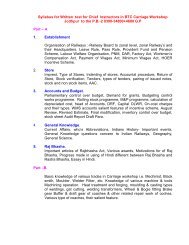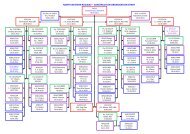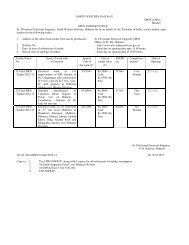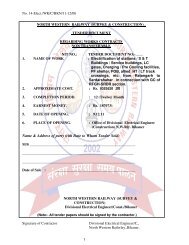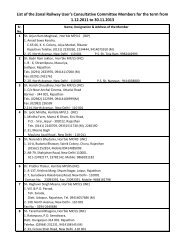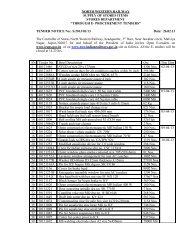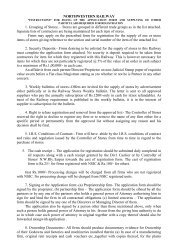OVERVIEW OF BIKANER DIVISION - North Western Railway
OVERVIEW OF BIKANER DIVISION - North Western Railway
OVERVIEW OF BIKANER DIVISION - North Western Railway
You also want an ePaper? Increase the reach of your titles
YUMPU automatically turns print PDFs into web optimized ePapers that Google loves.
1. Brief History<br />
<br />
<strong>OVERVIEW</strong> <strong>OF</strong> <strong>BIKANER</strong> <strong>DIVISION</strong><br />
The first <strong>Railway</strong> link to Bikaner was established on 9th Dec.,1891 as a part of Jodhpur State<br />
<strong>Railway</strong>. Bikaner State <strong>Railway</strong> came into existence in 1924. Direct Rail link between Bikaner<br />
and Delhi was established in 1941, At the time of re-organization of <strong>Railway</strong>s in 1952, Bikaner<br />
Division was formed and took over Bikaner State <strong>Railway</strong> and part of Delhi-Rewari-Fazilka<br />
section.<br />
<br />
<br />
Initially it was an MG Division with over 1800 route Kms. covering the States of Rajasthan,<br />
Haryana, Punjab and Delhi.<br />
Presently, the total route Kms. are 1777.342 with following break up of BG & MG<br />
Gauge B.G. M.G. Under G.C. Total<br />
Kms. 1369.762 224.94 182.64 1777.342<br />
BG conversion started on this division in 1978. After conversion, Kotkapura-Fazilka section<br />
was transferred to Firozpur Division to maintain BG continuity.<br />
<br />
<br />
<br />
<br />
<br />
<br />
<br />
<br />
With conversion of Bathinda- Rewari section to BG in 1994 an alternate shorter BG route has<br />
been opened connecting Ambala & Firozepur Divisions with <strong>Western</strong> & Central <strong>Railway</strong>s,<br />
thereby, reducing congestion in Delhi Area.<br />
Similarly with conversion of Bikaner-Merta Road route to BG, an alternate <strong>North</strong>-South route<br />
viz. Bathinda - Lalgarh - Bikaner - Merta Road - Jaipur and Bikaner - Merta Road -Ahmedabad<br />
has been opened.<br />
Steam traction operation on MG was discontinued in Jan.,1994 and all the steam sheds have<br />
since been closed and all the services dieselised.<br />
After formation of <strong>North</strong> <strong>Western</strong> <strong>Railway</strong>, section form Rewari to Delhi Sarai Rohilla has been<br />
transferred to Delhi division and the section from Rohtak to Bhiwani has been taken over from<br />
Delhi division w.e.f. April,2003.<br />
A New Broad Gauge rail link from Kolayat to Phalodi (112.09 Kms.) has been established on<br />
18.06.2007.<br />
Newly converted Rewari – Sadulpur section has been opened for passenger / freight operation<br />
w.e.f. 17.9.2008.<br />
Newly converted Sadulpur-Hisar section has been opened for passenger / freight operation<br />
w.e.f. 26.1.2009.<br />
Newly converted Bikaner – Ratangarh section has been opened for passenger / freight<br />
operation w.e.f. 30.03.2011<br />
Sarupsar- Sriganganagar section has been closed for Gauge Conversion since 15.12.2010<br />
<br />
Sriganganagar - Hanumangarh section has been closed for Gauge Conversion since<br />
01.02.2012
2. Infrastructure Facilities Available :<br />
PRS LOCATIONS (11)<br />
Bikaner, Sriganganagar, Hisar, Bhiwani, Hanumangarh, Suratgarh, Sirsa, Fatehabad (NRH),<br />
Suratgarh Cantt (NRH), Hisar cantt (NRH) and Salasar Balaji (NRH).<br />
UTS LOCATIONS (95)<br />
Bikaner, Suratgarh, Hisar, Bhiwani, Sriganganagar, Hanumangarh Sirsa, Sri Karanpur, Sri<br />
VijayNagar, Kesrisinghpur, Jetsar, Gajsinghpur, Ding, Bhattu, Raman, Kolayat, Tibi, Talwarajhil,<br />
Siwani, Dahinazainabad, Kaninakhas, Nangalmundi, DabwaliRathan, Dulmera, Bagwali, Lahli,<br />
Sangat, Mahahjan, Bawanikhera, Jatusana, Gadwala, Manheru, Satnali, Ramsinghpur, Banwali,<br />
Prithwirajpur, Baragudha, Suchankotli, Jakhodkera, Gurusarsahanewala, MohanNagar, Shergarh,<br />
Malkisar, Rampuraberi, Kanasar, Nathwana, Biradhwal, Dhaban, Ratangarh West, Manakasar,<br />
Arjansar, Rajiasar, Jitakheri, Bamla, Sudhrana, Jharli, Kishangarh Balawas, Rang Mahal, Harpalu,<br />
Benisar Bhiwani City, Dhirera, Birang khera, Gajner, Sohansara, Diyatra road, Aslu, Dokwa,<br />
Jamsar, Jagdeowala, Hadyal, Depalsar, Joharpura, Molisar, Parvezpur, Zerpur pali, Suratpura,<br />
Charaud, Jhumpa, Diplana, Gogameri, Sarupsar, Bhagwansar, Kalyankot, Anupshahar, Bigga,<br />
Parsenu, Nokhra, Bap, Sird, Malar, Dholipal, Sherekan, Khananiyan and Narwasi.<br />
PRS cum UTS LOCATIONS (32)<br />
Sadulpur, Churu, Lalgarh, Mandi Dabwali, Ratangarh, Sardarshahr, Mahendragarh, Charkhi<br />
Dadri, Hansi, Lunkaransar, Pilibangan, Hanumangarh Town, Nohar, Sadulsahar, Tehshilbhadra,<br />
Sangria, Kalannaurkalan, Ellenabad, Anupgarh, Satrod, Kalanwali, Mandi Adampur, Loharu,<br />
Raisingh Nagar, Kosli, Napasar, Sudsar, Sri Dungargarh, Sidhmukh, Nal, Rajaldesar and<br />
Dudhwakhara.<br />
TMS commissioned at Fifteen locations<br />
(Suratgarh Thermal Power, Bhattu, Sirsa, Hisar, Hanumangarh, Lalgarh, Sri Ganganagar,<br />
Bhiwani, Mandi Dabwali, Satrod, Kalanwali, Hansi, Jamsar, Kanasar and Suratgarh). :<br />
BG Sick line and Washing line facilities :<br />
SriGanganagar, Bhiwani, Lalgarh & Bikaner<br />
<br />
Fuelling Points:<br />
Bikaner , Hanumangarh and Churu
3. Major Loading Points (BG)<br />
<br />
Suratgarh, Anupgarh, Mandi Dabwali, Raman, Kalanwali, Sirsa, Bhattu, Mandi Adampur,<br />
Hansi, Bhiwani, Satrod & Kanasar<br />
Military Loading points : Lunkaransar, Arjansar, Mahajan, Birdhwal, Suratgarh,<br />
Hanumangarh & Satrod.<br />
4. Major unloading points (BG)<br />
<br />
Lalgarh, Suratgarh, Hanumangarh, Mandi Dabwali, Raman, Kalanwali, Sirsa, Bhattu, Mandi<br />
Adampur, Hansi, Hisar, Bhiwani, Satrod & STPS (Birdhwal) and MIGK.<br />
Military Unloading points: Lunkaransar, Arjansar, Mahajan, Birdhwal, Suratgarh,<br />
Hanumangarh & Satrod.<br />
5. Freight Traffic<br />
Outward : (i) Food grains from Rajasthan, Haryana & Punjab.<br />
(ii) Gypsum, Edible oil and oil seed from Rajasthan.<br />
Inward : Food grains, Cement, Fertilizer, POL and Iron steel over<br />
the division and Coal & POL to STPS (Birdhwal),<br />
MIGK Thermal Power station (Kosli) and MJPJ siding.<br />
6. Staff Strength : Comparative position of last three years<br />
Group Sanctioned Strength On Roll<br />
2009-10 2010-11 2011-12<br />
(Up to<br />
31.01.12)<br />
2009-10 2010-11 2011-12<br />
(Up to<br />
31.01.12)<br />
“C” 12415 12290 12189 11064 10718 10513<br />
“D” 00 00 00 01 00 01<br />
Total 12415 12290 12189 11065 10718 10514<br />
7. Total number of quarters<br />
Type I 5660<br />
Type II 1784<br />
Type III 223<br />
Type IV 66<br />
Type V 22<br />
Total 7755
8. Level Crossings:<br />
Gauge Manned Unmanned Canal 'D' Class Total<br />
BG 344 143 20 60 567<br />
MG 28 09 10 66 113<br />
Under GC 32 34 11 64 141<br />
Total 404 184 41 190 821<br />
9. LEVEL CROSSINGS : (As on 31.01.2012)<br />
Engineering - 611<br />
Traffic - 169<br />
Canal - 41<br />
----------------------------<br />
Total - 822<br />
----------------------------<br />
10. STATIONS<br />
Total No. of stations : 195 ( BG-140, MG-36, MG&BG – 08, under GC - 11)<br />
„B‟ class stations : 126 ( BG- 96, MG-16, MG&BG – 08, under GC - 06 )<br />
„DK‟ class stations : 03 ( BG - 2 & MG - 1 )<br />
„D‟ class : 02 ( MG - 2 )<br />
Halt stations : 64 ( BG-42, MG-17, under GC -05 )<br />
11. ADARSH STATIONS<br />
<br />
Lalgarh, Sirsa , Kosli, Bhiwani, Ratangarh, Churu, Sadulpur & Tehsil Bhadra have been<br />
nominated as „Adarsh Stations‟ in Bikaner division. The work of development at Lalgah,<br />
Sirsa , Kosli and Bhiwani have already been done. Whereas the work at Ratangarh is<br />
targeted to be completed by 31.03.12. Whereas the work at Churu & Sadulpur is targeted<br />
to be completed by 30.6.12.<br />
The work at Tehsil Bhadra station is expected to be under taken with G.C. work..
12. INTERCHANGE POINTS<br />
Broad Gauge - 13<br />
Bikaner - with JU Divn. Phalodi - with JU Divn.<br />
Bathinda (SOG side) - with UMB Divn. Sriganganagar - with UMB Divn<br />
Bathinda (SSA side) - with UMB Divn. Hissar - with UMB Divn.<br />
Bathinda (BBC side) - with DLI Divn. Rohtak - with DLI Divn.<br />
BTI Bye pass - with DLI Divn. Rewari (BNW side) - with JP Divn.<br />
Satrod - with UMB Divn. Rewari (LHU side) - with JP Divn.<br />
Ratangarh<br />
- with JU Divn<br />
13. EXAMINATION DEPOTS<br />
i) Freight Examination Depots : NIL<br />
ii) Carriage Examination Depots : BG : Bhiwani, Bikaner, Lalgarh & Sri Ganganagar<br />
14 FUELING POINTS : Bikaner, Hanumangarh, Churu<br />
15. FULL RAKE GOODS HANDLING STATIONS<br />
BG : 26 Stations ( LGH, KLYT, KNSR, JMS, LKS, MHJ, AS, BDWL, SOG, SBNR, RMSR APH, PGK,<br />
HMH, SGNR, MBY, RMN, KNL, SSA, BHT, ADR, HSR, STD, HNS, BNW, SDLP)<br />
HALF RAKE GOODS HANDLING STATIONS :<br />
BG : 1 Station ( HMH - POL Siding )<br />
16. MEDICAL FACILITIES<br />
1. <strong>DIVISION</strong>AL HOSPITAL - LALGARH<br />
2. HEALTH UNIT - <strong>BIKANER</strong>, HANUMANGARH, SURATGARH,<br />
SIRSA, RATANGARH,CHURU, SADULPUR,<br />
HISAR
History of Bikaner<br />
The Bikaner city was founded by Roa Bika Ji in 1486 and from its small origins it has<br />
developed into the fourth largest city in Rajasthan.<br />
The regal fortified city of Bikaner is an integral part of the desert triangle comprising Jaisalmer,<br />
Bikaner and Jodhpur. Bikaner is located at the north of Rajasthan and oozes the medieval charm.<br />
This desert city is known as the camel country for its best Safaris on camels. Bikaner underwent a<br />
transformation under its enlightened ruler Maharaja Ganga Singh (1880-1943 AD). He promoted<br />
the Ganga Canal project which converted large tracts of desert land into rich farm land. He also<br />
extended the <strong>Railway</strong> line in the state for easy accessibility.<br />
Bikaner is also known for Bikaneri Bhujia, Papad and Bikaneri Rasgulla.<br />
TOURIST PLACES<br />
Junagarh Fort - Junagarh Fort is situated in the city of Bikaner, Rajasthan. The fort was<br />
originally called Chintamani and was renamed Junagarh in the early 20th century when the ruling<br />
family moved to Lalgarh. Some places of interest<br />
inside the fort are Anupmahal, Ganga Niwas and<br />
Rang Mahal or place of pleasure. Har Mandir in a<br />
majestic chapel where the Royal family<br />
worshipped their gods and Goddesses. Chandra<br />
Mahal or moon place has exquisite painting on its<br />
lime plaster walls and Phool Mahal or the 'Flower<br />
place' is decorated with inset mirror work. Towering<br />
columns, arches and graceful screen adorn these<br />
places. Durbar hall, Gaj Mandir, Sheesh Mahal and Karan Mahal are some other buildings worth<br />
seeing.
Lalgarh Palace complex and Sadul Museum - Lalgarh<br />
place was build between 1902 and 1926 according to<br />
Rajput, Mugal and European Architectural style. The<br />
building was commissioned by Maharaja Ganga Singh<br />
(1889-1925) in memory of his father Maharaja Lall Singh<br />
and was designed by the British architect, Sir Swinton<br />
Jaceb. It is coated in red sand stone and has several grand<br />
hall , lounges, cupolas and Pavilions, the building features<br />
magnificent pillars, elaborate fireplaces, Italian colonnades<br />
and intricate latticework and filigree work. The palace houses the Shri Sadul Museum as well as a<br />
large and important collection of Sanskrit manuscripts, the Anup Sanskrit Library. Though the<br />
Bikaner Royal family still live in the palace, part of the building has been converted into a Heritage<br />
hotel operated by the Royal family of Bikaner.<br />
Bhandeshwar Jain Temple -<br />
This 15th century temple is the oldest existing monument of<br />
Bikaner, dedicated to Sumati Nath Ji, the 5th Tirthankara of<br />
the Jain religion. The temple was built by a Jain Merchant<br />
Bhanda Shah. It is believed that the temple was made with<br />
40,000 kilogrames of pure ghee instead of mortar which<br />
seeps through the walls on hot days. Another tradition assume<br />
that the foundation of the temple building was filled by Pure<br />
ghee and dry coconuts,<br />
The temple is mainly famous for wall painting and Golden<br />
Usta art. One can see the Skyline of Bikaner by climbing to the topmost floor of this temple.<br />
Havelies - This camel country abounds in beautiful havelies and mansions belonging to the<br />
business houses of those times. There are beautiful structures in red sand stone, richly<br />
decorated with intricate carvings. The notable havelies belong to the Kotharis, Rampurias,<br />
Vaidyas and Dagas.<br />
Rampurias Haveli
National Research Centre on Camels - Camel farm is<br />
unique and only one of its kind in Asia. It is a Premier<br />
Research Centre of the Indian Council of Agricultural<br />
Research (ICAR) founded on 5th July 1984. The Centre is<br />
located at a distance of about 10 KM from Bikaner city.<br />
The camel Breeding Farm of Bikaner, breeds the<br />
finest of camels in Bikaner.<br />
At camel breeding farm of Bikaner, the tourists can<br />
experience the thrill of camel rides. The tourists can also see<br />
camels frolicking and feeding at the farm. One can experience the gamboling of the baby<br />
camels at the camel breeding farm of Bikaner. The tourist can also enjoy the nutritious camel milk<br />
and its milk products like Kulfi, Flavored milk , Tea and Coffee at milk parlor established at the<br />
centre for the tourist visiting the campus.<br />
Gajner Palace and Wild life sanctuary (32 KMs from<br />
Bikaner)- The wild life sanctuary, amidst lush green<br />
surroundings on the road of Jaisalmer, is a haven for<br />
chinkara, black buck, Nilgai, Wild boar and imperial<br />
sandgrouse and many birds and waterfowls which flock here<br />
in large numbers.<br />
The hotel's compound stretches over 6000 acres. the<br />
palace was primarily a hunting resort during the days of the<br />
British Raj and attracted several dignitaries, including the prince of Wales in 1905, Governor<br />
General Lord Elgin, Lord Erwin in 1927 and Lord Mountbatten when he was Viceroy of India. The<br />
Palace complex also has the remnants of a historic railway station. This hunting resort was<br />
connected to Bikaner by rail in 1922. Christmas season was often celebrated with prearranged<br />
duck and Imperial sand grouse shoots. The palace turned grand Heritage hotel holds a world<br />
record of being largest (in terms of area) hotel in the world.
Camel Festival<br />
Every year in the month of January the Camel Festival is<br />
organized by the Rajasthan Tourism, in Bikaner at Ladera<br />
village which is 50 Km. away from Bikaner.<br />
It attracts tourists from India and abroad in large number.<br />
Camels, the stalwarts of the desert, put up an unmatched<br />
performance during the festival bringing the desert town to life<br />
with their spellbinding display of graceful parades and stunning<br />
feats. The festival sways to the sound of melodious music<br />
created by the folk for performers. Various Camel contests are<br />
also held during the festival. Contests for foreigner and Indian tourists are also held in the camel<br />
festival.<br />
Deshnoke - Karni Mata Temple : On way to Jodhpur 30 Km<br />
away from Bikaner there exist unique temple of karni Mata. The<br />
rats called 'Kaba's' in local language are venerated here and the<br />
shrine is a sanctuary for them. Karni Mata was a Charan ( A<br />
caste in Rajsthan) woman who is said to have possessed<br />
spiritual powers. It is believed that these Kabas carry souls of<br />
future Charans (Deepawats) who inhabit the region. Held<br />
sacred, they roam freely in the temple precincts. It is considered<br />
highly auspicious to sight a white Kaba.<br />
Kolayat Ji - Kolayat is a <strong>Railway</strong> station on Lalgarh - Phalodi section of Bikaner division where<br />
famous Kolayat Ji lake is situated and is a place of<br />
pilgrimages for Hindus. In older time, it was called<br />
Kapilayatan as the mythological belief is that kapil Muni, the<br />
profounder of the Sankhya system of the Hindu philosophy,<br />
while journeying towards north west was bewitched by natural<br />
beauty of this place and choose it to perform tapasya for<br />
redemption of the world. There are several marble temples,<br />
pavilions and 52 bathing ghats here and a dip in the waters,<br />
especially during Kartik Purnima is considered to be most auspicious.


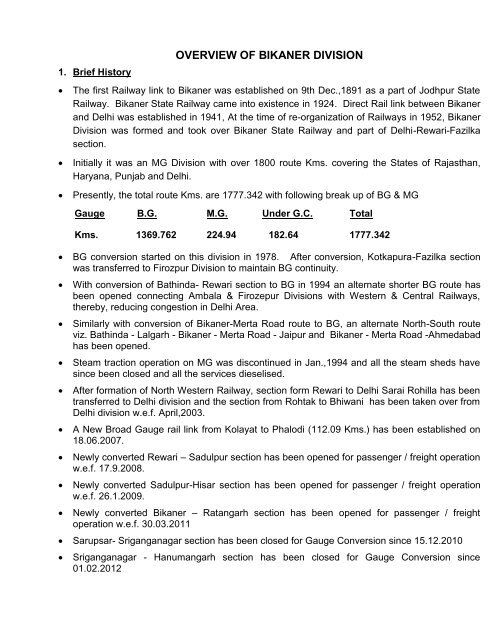
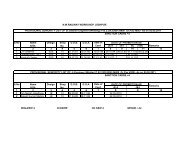
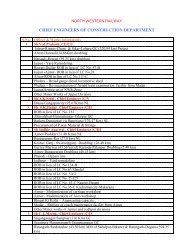
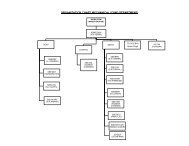
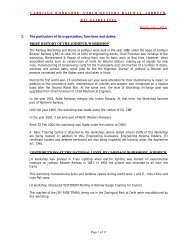
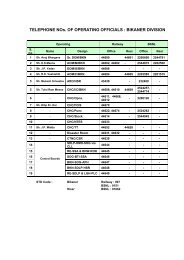
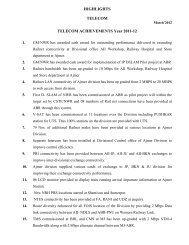
![dSfjt dk;Z'kkyk] mRrj if'pe jsy o¢] t¨Ãkiqj lhohlh ds ekxZ funsZ' k Ekkg ...](https://img.yumpu.com/24841671/1/190x245/dsfjt-dkzkkyk-mrrj-ifpe-jsy-oa-taakiqj-lhohlh-ds-ekxz-funsz-k-ekkg-.jpg?quality=85)
